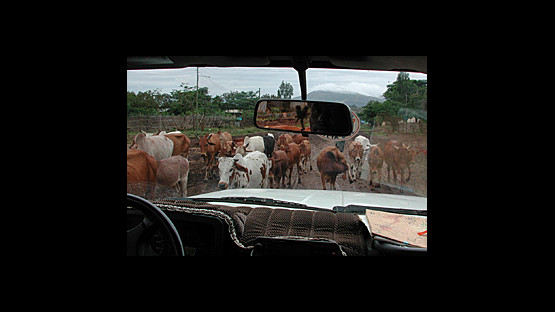An outbreak of the insidious ´screw worm´ fly in Yemen, is threatening livelihoods, in a country where rearing livestock is a traditional way of life. In recent weeks, a Ministerial delegation was at the IAEA in Vienna, Austria, to turn to the international community for emergency assistance to fight the deadly pest.
The menacing fly lays its eggs in a cut or open wound of a warm-blooded animal. The maggots then feast off the living flesh, and can kill the animal if it´s not treated in time.
The outbreak hit the country´s coast late last year. Veterinarian, Mansoor AlQadasi, General Director of the Central Veterinarian Laboratory, says it´s the first official outbreak of ´old world´ screw worm in Yemen.
"There are about 20,00O cases of livestock affected. Most of these are sheep and goats. We have also found some human cases -- mainly in children and older people," Mr. AlQadasi said.
Mr. AlQadasi fears the fly, which travels up to 200 km, will spread inland.
"This can lead to a severe impact on the lives of people. We have a huge population who rely on animals. They do not own land, but they own animals. It can lead to severe social and economical problems for those families who totally rely on the marketing of animals and get income from this. This is a source of his life," Mr. AlQadasi said.
Emergency assistance to fight the pest is needed. The United Nation´s International Atomic Energy Agency, the Food and Agriculture Organisation and the Arab Organization for Agricultural Development, are among those to respond.
Entomologist, Udo Feldman, from the Joint FAO/IAEA division in Vienna explains:
"Well initially it is quite obvious that more specialists, veterinarians, need special training on identification of the larvae; on advising farmers what to do; on treating the animals; on establishing reporting structures. Also entomological monitoring, the techniques need to be conveyed and that is what the IAEA can do right away," Mr. Feldman said.
The disease is curable if treated early. The animal´s wound is scraped clean of maggots then insecticides are applied to kill any remaining eggs.
It´s thought the pest was introduced into Yemen after infected cattle were imported from neighbouring countries.
"This insect pest is not restricting itself to one country, flies have no passports, they just cross over -- we have to develop a regional approach. That is the second part of what the FAO/IAEA can provide, to develop a concept, assist the developing counties with strategies and policies to address this problem in the longer term. But this needs to be a regional approach where other countries, Saudi Arabia, Iraq and possibly Iran, Oman and so forth need to be included," Mr. Feldman said.
Part of a possible long term approach, involves scientists and farmers teaming together to fight the flies using the screw worm against itself. It´s called the sterile insect technique. Essentially, it´s birth control for flies. Millions of male screw worm flies are bred and sterilised with radiation, then released into the wild. The technique has worked to eradicate screw worm in North and Central America and in Libya.
"Libya in 1988 had an outbreak of new-world screw worm flies through a shipment of live animals to North Africa, to Libya, the pest was also exported. So a non-endemic, very dangerous pest was introduced. And at that time, the international community also initiated an emergency response because it was very dangerous to see the fly spreading. If it would have arrived at the Nile Delta, it would have been the highway to Africa with all wildlife endangered and so forth. The international community responded very quickly and within four years, in 1992, the pest was eradicated," Mr. Feldmann said.
According to Mr. Feldmann, the feasibility of approaches like the Sterile Insect Technique needs to be assessed to fight pest diseases. As increasingly vectors spread to new locations, brought about by global trade and climate change.
"This is becoming more and more important in the context of increasing international trade, climate change. Pest scenarios have developed quite a dangerous and frightening development change. Agricultural pests, vectors of insect diseases, are invading into areas where they were not reported before, and at the IAEA/FAO Joint Division we have to develop techniques and concepts to have at hand when the countries need it and this is exactly the situation in Yemen now," Mr. Feldman said.
It is hoped the emergency assistance can stem the spread of screw worm further in Yemen.


